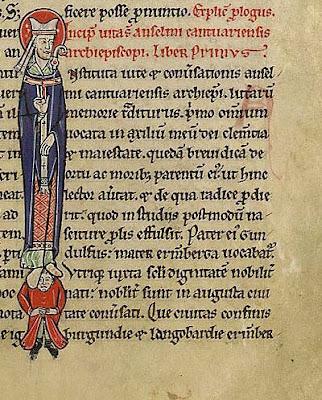900th Anniversary, Feast of St. Anselm
 Manuscript Vita of St. Anselm, detail |
Anselm is often cited as the founder of the Scholastic movement of philosophy and was in later years given the rank of Doctor of the Church for his theological and philosophical writings. His most famous philosophical idea is the so-called ontological proof of the existence of God, quoted below. Anselm staunchly opposed the interference of the state in church affairs but just as staunchly opposed the crusades as wars sponsored wrongly by the church. He died in peace on April 21, 1109. He is buried at Canterbury Cathedral, the loss of which to a heretical sect (in fact, a result of the most egregious interference of the English government in church affairs) he would certainly condemn.
Excerpt from Chapter 2 of Anselm's Proslogium (translated from the Latin by Sidney Norton Deane, with some updating):See also these Other Works by St. Anselm of Canterbury. For a lighter version, a philosophy professor set a version of Anselm's ontological proof to the tune of Waltzing Matilda. A few years ago I had my student choir sing it, and it works quite well.
And so, Lord, who gives understanding to faith, give me, so far as you know it to be profitable, to understand that you are as we believe; and that you are that which we believe. And indeed, we believe that you are a being than which nothing greater can be conceived. Or is there no such nature, since the fool has said in his heart, there is no God? (Psalms xiv. 1). But, at any rate, this very fool, when he hears of this being of which I speak -- a being than which nothing greater can be conceived -- understands what he hears, and what he understands is in his understanding; although he does not understand it to exist.
For, it is one thing for an object to be in the understanding, and another to understand that the object exists. When a painter first conceives of what he will paint later, he has it in his understanding, but he does not yet understand it to be, because he has not yet performed it. But after he has made the painting, he both has it in his understanding, and he understands that it exists, because he has made it.
Hence, even the fool is convinced that something exists in the understanding, at least, than which nothing greater can be conceived. For, when he hears of this, he understands it. And whatever is understood, exists in the understanding. And assuredly that, than which nothing greater can be conceived, cannot exist in the understanding alone. For, suppose it exists in the understanding alone: then it can be conceived to exist in reality; which is greater.
Therefore, if that, than which nothing greater can be conceived, exists in the understanding alone, the very being, than which nothing greater can be conceived, is one, than which a greater can be conceived. But obviously this is impossible. Hence, there is no doubt that there exists a being, than which nothing greater can be conceived, and it exists both in the understanding and in reality.





















































No comments:
Post a Comment